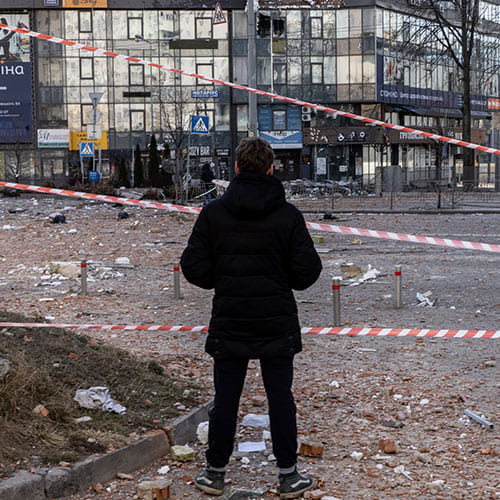Joe Barnes
Bonner Means Baker Fellow
Russia is going for the kill in Ukraine. Large numbers of Russian troops have moved from the north, east and south. While the battlefield situation remains unclear, all appearances suggest that Moscow seeks, at a minimum, the decapitation of the Ukrainian government in Kyiv and its replacement by a client regime. Russian President Vladimir Putin clearly wants to extend Russian control to former parts of the Russian Empire, beginning with Ukraine. This is particularly true given Ukraine’s clear determination to integrate into the West. To date, the Russian military has failed to deliver a knock-out blow to Ukrainian forces, which have waged a fierce defense. (As of writing, there are ceasefire talks between Ukraine and Russia.)
This invasion is many things. It is an egregious and illegal act of international aggression. It is a tragedy for Ukraine, which – despite its faults – is a democratic country that represents no military threat to Russia. The invasion also represents a severe challenge to the United States and its European partners.
President Biden’s approach has been one of forthright – if limited – support for Ukraine. He has repeatedly stated that the United States will not send U.S. troops to Ukraine. But, as the crisis developed, he threatened a host of sanctions should Russia attack. At one level, those threats failed; they did not deter Russia from invading its neighbor. But the threats did help with the hard work of assembling a largely solid NATO and EU front against Russian aggression. Since the attack, the United States and Europeans have issued a series of sanctions against Russia. Some are against individuals (including President Putin and Russian Foreign Minister Sergei Lavrov); others are against institutions (including Russia’s central bank.) Sanctions on Russia’s large energy sector are largely off the table, at least to date. This reflects Russia’s important role in international oil and gas markets. Europe, in particular, is highly dependent on Russian natural gas. These sanctions will inflict pain on the Russian leadership and damage the Russian economy. Whether they will cause Russia to withdraw from Ukraine, at least in the short run, is far from clear.
What will affect Putin’s short-to-medium term thinking is the scale and duration of Ukrainian resistance, whether by Ukrainian military forces or, further down the road, by a guerilla insurgency. A quagmire in Ukraine would surely weaken Putin’s position at home.
Biden, working with NATO, has also dispatched more forces to NATO countries bordering Russia. These are meant to reassure these countries of NATO’s determination to defend them should Moscow move aggressively against member states. The U.S. is sending additional arms to Ukraine; so are other NATO countries.
Whatever Putin’s objectives, Russia might well have bitten off more than Russia can chew. Even a decisive defeat of the Ukrainian military still leaves the prospect of a long occupation of parts of Ukraine. The Russians will not be welcomed as liberations by the vast major of Ukrainians; there is no prospect that a puppet Russian government could count on public support. An ugly insurgency is highly likely, one in which the United States and other countries will supply anti-Russian forces.
At an important level, the invasion has already yielded bitter fruit for Putin. Far from weakening NATO, the invasion has led to a reinvigoration of the alliance. Germany, after some initial hesitation, has taken decisive steps against Moscow. These including stopping the Nordstream 2 gas pipeline project from Russia to Germany, the provision of lethal weaponry to Kyiv, and an announcement that Berlin will embark on a substantial military build-up. For NATO, the Russian threat has moved from latent to acute. There is even talk – preliminary at this point – that Finland and Sweden might seek to join NATO.
Whatever the outcome of the war, it surely marks a watershed moment for Europe and the world. We will likely see a drive to increase the size and (importantly) preparedness of NATO forces. This will almost certainly require additional U.S. resources in the European theater as well. Such commitments will occur against the backdrop of a rising Chinese military threat in East Asia and substantial U.S. commitments in the Middle East. We have been stretched thin strategically for some time. The war in Ukraine has thrown this into sharp and painful relief. Increased burden-sharing by partners in Europe and East Asia will help, but American leadership comes with a price – in this case, the need to bolster military expenditures. The alternative is curtailing U.S. commitments. Either course will be painful and politically fraught.
We moved decisively into a multipolar world. The rise of a revanchist Russia and an aggressive China have ended the unipolar system that emerged from the end of the Cold War. The United States remains a country of immense economic and military strength, supported by a robust set of international alliances. But the 1990s – an era of unprecedented U.S. dominance in world affairs – are long since passed. Our policies must catch up with this hard reality. Ukraine is a wake-up call.
